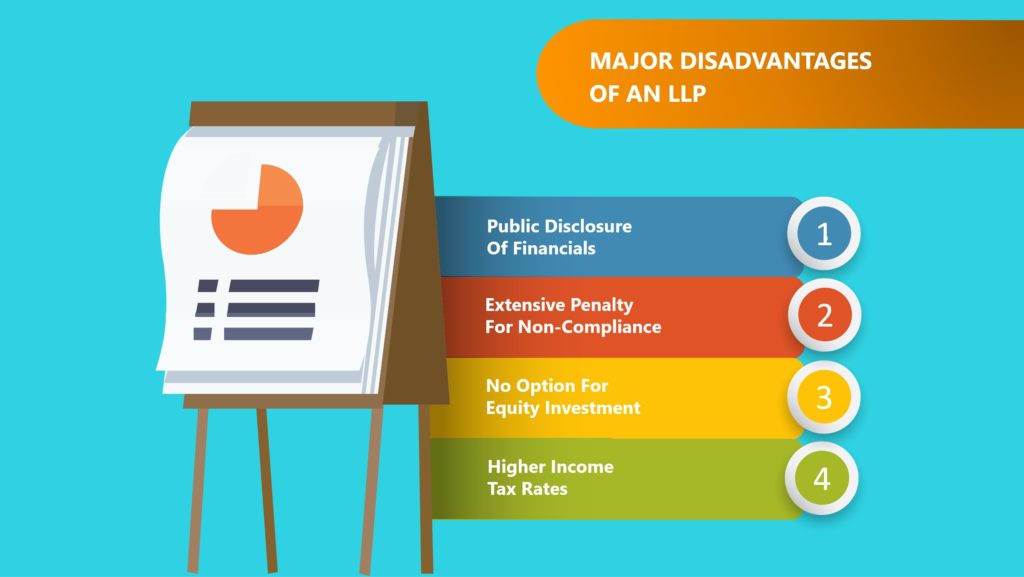Choosing the right business structure for your business is critical for its success. As any error in that matter can make or break your business, you should weigh all the pros and cons before making any decision.
Indian legal system offers a wide range of options when it comes to a Business structure. As the needs of every Business are unique, it is important to understand your business goals and take steps accordingly.
In this blog, we will be discussing some advantages and disadvantages of an LLP (Limited Liability Partnership). Although it’s a comparatively new business structure, it is gaining some popularity recently. So, let’s begin with the introduction about an LLP first.
LLP Introduction
Introduced in the year 2000, an LLP (Limited Liability Partnership) is governed by the Partnership Act 2000. This Business structure is unique as even though it’s not under the Company’s Act, partners of an LLP enjoy the benefit of Limited Liability. Apart from this, an LLP also enjoys the flexibility of a Partnership firm.
Such a Business structure is well-suited for multiple professions like Consultants, Architects & Accountants, where the individual income of the partners is clearly defined.
Now let’s check out the disadvantages of an LLP
Disadvantages of an LLP Registration

1. Public Disclosure of Financials
As an LLP is mandated to submit all of its financial records to the Companies House, the income details of every Partner are available in Public. This can be a major concern for some individuals who do not prefer to disclose their financials in the public domain.
2. Extensive Penalty for Non-Compliance
An LLP is easy to start and manage, but the penalties involved in not following the compliances actively is heavy. The penalty may be as high as 4-5lakhs in some cases.
All the LLPs are required to file annual Income Tax Return & MCA (Ministry of Corporate Affairs) return every year even if it has not performed any Business Activity. This is a major cause of concern for LLPs.
As the penalty for failure to submit these returns is INR 100 per day, this can cause a significant financial loss to the Businesses. Moreover, there is no upper cap on this penalty, which means if left unpaid, this amount can run into lakhs.
3. No option for Equity Investment
As there is no concept of Equity investment, all the investment has to come from the Partners. So it is not possible to scale-up the Business.
4. Mandatory Indian Partner
As per law, it is mandatory to have an Indian Partner for establishing an LLP. No foreign national or NRI can establish an LLP in India by themselves.
5. Higher Income Tax rates
The tax rate for an LLP is 30%, irrespective of the amount of the total turnover. Also, a surcharge of 12% is applied, if the income exceeds INR 12 crore.
This rate is considerably higher than the income tax rates applicable to the companies. An LLP with lower turnover would have to pay a considerably high chunk of their income.
6. No tax-benefits for Partners
The income of a Partner in an LLP is treated as the income of an individual & taxed accordingly. This means there is no tax benefit for the Partners of an LLP
7. Minimum Two members
As per the Law, an LLP must have at least two members. In any case, if any member chooses to leave the LLP, it will be dissolved automatically. This can hamper the normal Business operations in the case of sudden demise or inability of a Partner.
8. Transfer of Ownership
Transferring the ownership right to someone else is a challenging task. The Partners wishing to transfer/her rights will need written consent from all the partners. In case if some Partner raises an objection, the transfer process cannot proceed further.
Also, there are many advantages of having an LLP company. Some of the major advantages are listed below.
Advantages of an LLP registration
1. Compliances
The compliances required for starting and managing an LLP company are quite a few and simple. Hence an LLP is easier to start and manage.
2. Minimal Registration expenses
As the registration process of an LLP is comparatively simple, the initial cost of registration is lowered. Such lower-cost is very helpful for the businesses that are looking for an affordable way to start their Business.
3. Limited Liability
This is the primary reason for a number of people for opting LLP. Unlike a standard Partnership firm where every Partner is equally liable for any financial losses or debt of the firm, Partners in an LLP enjoy Limited Liability.
Their Liability is limited up to their Contribution to the partnership. So in case of any financial issue, the personal assets of all the Partners will remain unaffected. Moreover, the Partners cannot be held liable for any unpaid debts of an LLP. This gives immunity to the Partners, except in case of any fraudulent activity.
4. No mandatory Audit
All the registered Companies are required to perform mandatory audits every year, but LLP are not required to do so unless the annual turnover exceeds ₹40 lakh or the total contribution of partners exceeds ₹ 25 lakh.
5. No upper-cap on the number of Partners
Unlike a Partnership firm & a Private Limited Company, there is no upper cap on the number of partners in an LLP. This is very helpful for Businesses that demand a lot of capital investment.
6. No DDT (Dividend Distribution Tax)
For Company, if the owner withdraws funds from the Company account, it will incur additional DDT. But for an LLP, such withdrawals do not attract DDT, reducing the tax burden on the Partners.
Final Thoughts
Like every Businesses Structure, an LLP too has some Flaws & Specialities. If you are looking for a Business structure that offers more flexibility and limited Liability, LLP can be a good option.
But LLP’s disadvantages like higher penalty & no tax-benefits make it a not-so-attractive option for Businesses that are looking for Superior Business Growth in the long-term.
But before making any decision on choosing your business structure, it is always good to have to weigh everything.
A better option is to consult a taxation expert who can help you better understand the feasibility of any Business structure.




No comment